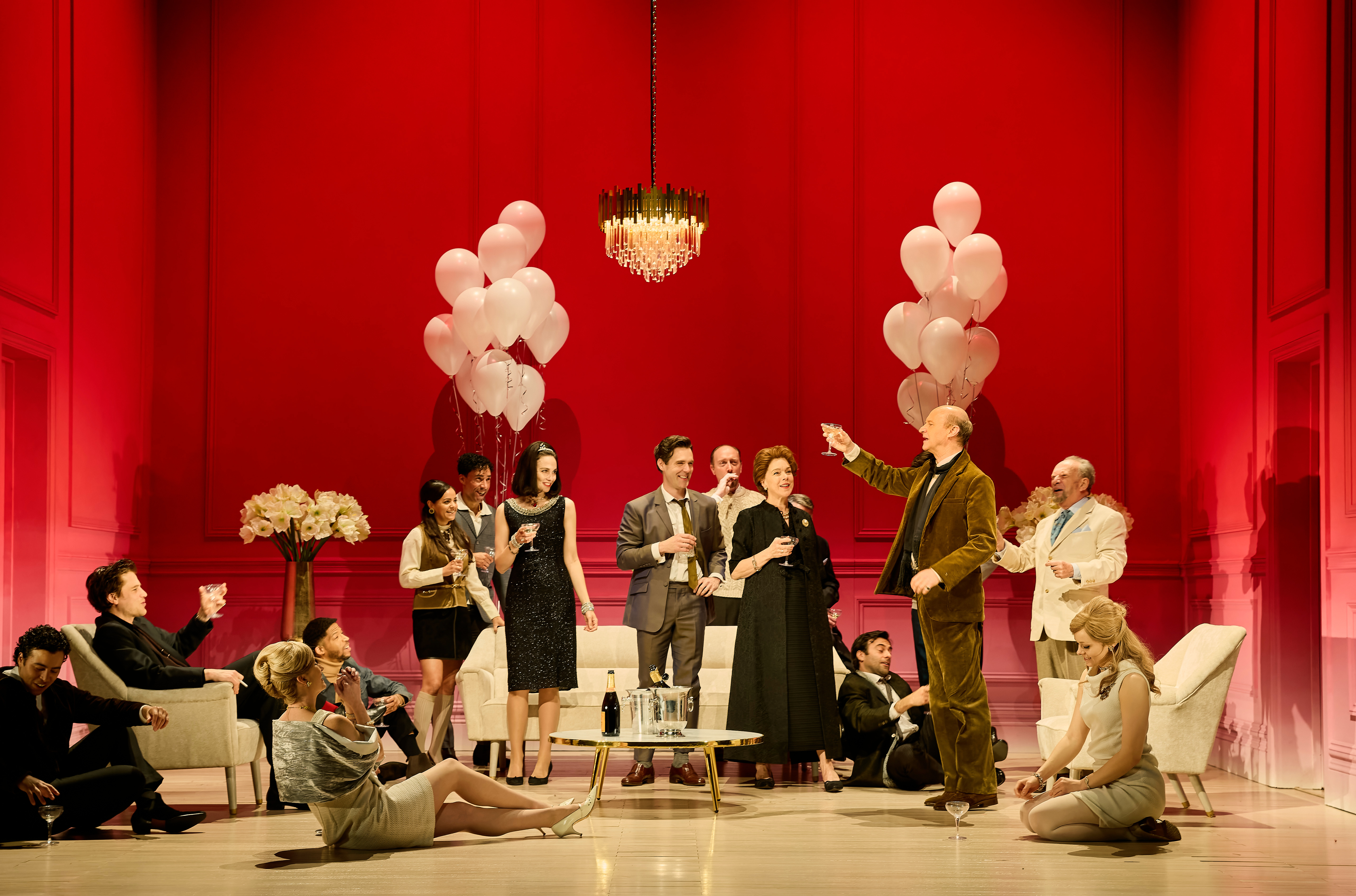Johnny Flynn and Mark Gatiss on taking 'The Motive and the Cue' to the West End
The actors discuss how playing Richard Burton and John Gielgud in Jack Thorne's The Motive and the Cue mirrors their own work in the rehearsal room.
We all love a juicy backstage drama, so it’s no surprise that Jack Thorne’s funny and moving new play The Motive and the Cue is heading to the West End following a hit run at the National Theatre. The show looks back at the 1964 Broadway production of Hamlet starring Richard Burton and directed by John Gielgud – specifically at the fireworks in the rehearsal room.
Burton is eager to be taken seriously as a classical actor following his celebrity marriage to Elizabeth Taylor, while at 60, Gielgud fears becoming irrelevant. Directed by Sam Mendes, The Motive and the Cue is playing at London’s Noël Coward Theatre.
The production’s two wonderful leading men are making the transfer as well. Johnny Flynn, star of stage and screen, and also a successful musician, plays Burton, while the renowned writer, actor and director Mark Gatiss plays Gielgud.
Did you know much about this Hamlet beforehand?
Johnny Flynn: I didn’t, although weirdly I’ve had a postcard of Burton playing Hamlet from another production, in 1953, on the mirror by my front door for 10 years.
Mark Gatiss: I first thought Jack had made it up. But likewise I was very aware of Gielgud – I actually wrote to him.
What was your way into these legendary figures?
Flynn: We’re lucky in that there’s a tremendous amount of material. In the case of Burton, there are diaries, biographies, all the films, and he wasn’t shy of giving an interview. It doesn’t happen like this anymore: there are interviews with him and Liz [Taylor] where they’re pissed and jibing each other in an unguarded way. Then there’s the rehearsal diaries, that our play is based on, by Richard Sterne and William Redfield.
Gatiss: Reputation is a very elusive thing. Incredibly, some people who came to see the show hadn’t heard of either Burton or Gielgud! For me, it’s all about the voice. I’ve been doing Gielgud’s voice since I was young.
Flynn: I worked with the National Theatre’s amazing dialect coach. But also I moved to Pembrokeshire when I was 14, so I grew up with recordings of Burton. Recently he’s been reading me to sleep with Under Milk Wood. At this point in his life, the accent is Hollywood Hills meets the Welsh Valleys – glam Welsh.

Does it feel similar to your real experience of the rehearsal room?
Gatiss: One of the strangest things about the whole show – and the most fun – is the levels of meta in it. Right now we’re literally in the rehearsal room, re-blocking some of it, and the scene is about people standing around in the rehearsal room, blocking the action! Actually, a lot of actors have said to us they found those scenes uncomfortable – not necessarily that they’ve had that level of bad behaviour, with Burton getting drunk, but sticky moments where the atmosphere changes.
Flynn: Mark is also going off in the evenings to watch the play he’s directing, The Unfriend, in rehearsal – and then in the day he’s playing a character who’s a director.
Is this an interesting moment to explore in both men’s lives?
Flynn: It’s a real gift of a situation. Laurence Olivier is the big ghost for both of them: Burton was called Olivier’s natural successor, and he’s struggling to live up to that, while Gielgud was a great Hamlet on stage, but everyone talks about Olivier’s Hamlet film.
Gatiss: Gielgud really thought his career was over after he was arrested [for cruising for gay sex], and he felt out of step with where theatre was going. The play examines how Burton was very cruel to him despite his hero worship of Gielgud – probably because he felt insecure about his performance – with his casual homophobia, in a place, theatre, that was a sanctuary for Gielgud. We also have wonderful barbed putdowns from Gielgud to Burton. My favourite is ‘I saw your last Hamlet – it was ridiculous’.
Has the staging changed much for the West End?
Gatiss: Nothing’s as wide as the Lyttelton [at the National], so we’re adjusting for that. Mostly it’s exciting to look at it again and recalibrate it. Sam [Mendes] had things at the back of his mind that he never got a chance to do last time round.
Does it also act as a love letter to theatre?
Flynn: It really does. We were workshopping this in lockdown in 2021, yearning to be back in the rehearsal room and creating together, and have audiences congregating again.
Gatiss: Equally you don’t need to know anything about theatre to enjoy it. It’s also about fame, addiction, class, fathers and sons, ghosts. It’s got everything – just like Hamlet!
Book The Motive and the Cue tickets on London Theatre.
Photo credit: Flynn and Gatiss in The Motive and the Cue. (Photo courtesy of production)
Photo credit: The cast of The Motive and the Cue. (Photo by Mark Douet)
This interview first appeared in the December 2023 issue of London Theatre Magazine.
Originally published on

